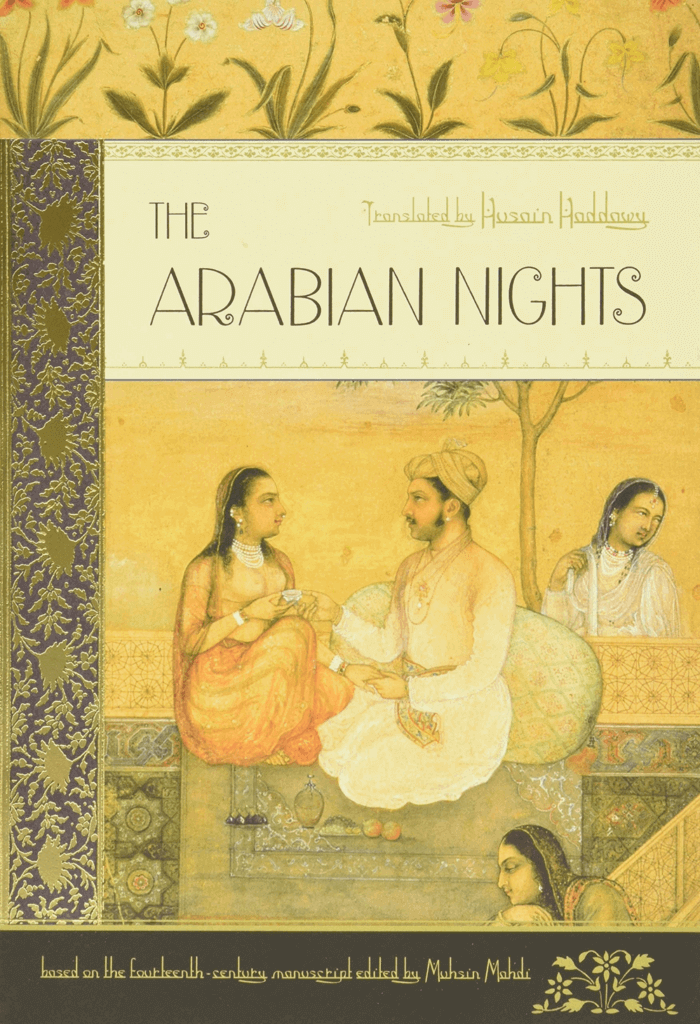Arabian Nights, also known as One Thousand and One Nights, is a well-known Arabic collection of Persians, Indian, and Arabian folktales originally written in Arabic and compiled during the Islamic Golden Age. It is a story of a Shahryar, a king of a great empire, scorned by his wife’s infidelity. He was devastated and thought that all women were the same. He decided to marry a virgin every day and kill them in the morning before they had a chance to betray him. Eventually, the king’s adviser could not find any more virgins in town, which led him into offering his own daughter named Scheherazade. As she married the king, she began to tell the king a tale that had no end. Thus, the king always postpones her supposed execusion.
The manuscript had passed through generations and had several versions and translations floating around. The best version could be Mahdi’s edition translated by Husain Haddawy based on the Syrian recension and used the same manuscript used by Gallard. The version is more concise, accurate, and easy to read. Another good version is Malcolm Lyons’ translation which used Egyptian recension and added oral tradition tales from Gallard’s version. This version is readable prose and is uncomplicated.

What is the best English translation of 1001 Arabian Nights?
There are several English translations of the Arabian Nights, including translations from Jonathan Scott, Hent Torrens, Edward William Lane, Edward Powys Mathers, John Payne, and Richard Francis Burton. Among these English versions, Burton’s translation has been the favorite version of the public, even though it has been criticized for its archaic language and extreme erotic details. Many have considered Burton’s the best English version of One Thousand and One Nights because it has the finest, complete, and uncensored translations from Egyptian recension.
Later, two other modern English versions were released. Both Haddawy’s (Syrian recension) and Lyons’ (Egyptian recension) stood out because it is more concise, accurate, and easy to read than the older English versions. These versions removed sexist and racist references and added stories previously omitted featuring female protagonists (i.e., Parizade, Pari Banu, and the horror story Sidi Numan).
English translation of the Arabian Nights that are available as Kindle books?
Amazon Kindle e-book offers a revised edition of The Arabian Nights. Some of the English versions you can find in the Kindle e-book are:
- The Arabian Nights (AmazonClassics Edition), translated by Andrew Lang, includes editorial revisions.
- The Arabian Nights (New Deluxe Edition) Kindle Edition translated by Husain Haddawy. It’s a complete text of the Mahdi edition from the Syrian manuscript.
- The Arabian Nights: Tales from a Thousand and One Nights (Modern Library Classics). This edition reproduces the 1932 Modern Library edition, including tales of Alaeddin, Sinbad the Seaman and Sinbad the Landsman, and Ali Baba.
- The Arabian Nights: Tales of 1,001 Nights: Volume 2 (The Arabian Nights or Tales from 1001 Nights) is a translation of Malcolm Lyons, one of the best modern English translations.
- The Arabian Nights Complete and Unabridged (Unexpurgated Edition). It is a Halcyon Classics translated by Richard Burton.
What language was Arabian Nights written?
The epic collection of middle eastern folktales that has been translated into several languages and several versions was originally written in Arabic entitled, Alf Laylah wa-Laylah whose author is unknown. The manuscript is believed to first existed in the 19th century and has been compiled and published by French translator Antoine Galland in 1700.
Which version of Arabian Nights is the best?
The version that had the most popularity and success in the public is Huddawy’s version which, is perceived as stylistically cohesive and accurate from the original manuscript. Some would say that Burton’s translation remains the best version as it has the complete version and contains unexpurgated translations. Some recommended the Penguin Classics edition, and others recommends Malcolm’s poetic version. In conclusion, the best version would depend on the reader. Language, readability, clarity, and conciseness are great factors in considering which version to pick from the list.
Who first translated 1001 Arabian Nights?
Antoine Galland is a French orientalist and translator who first compiled and translated the Syrian manuscript. He published his version in the 1700s in 12 volumes as Les Mille et Une Nuits. He added oral tales gathered from an ethno-religious Christian group Maronites member named Hanna Diyab. The first English version is known as The Grub Street edition whose translator is unknown. It was first noted in 1706 and existed in two copies kept in the Bodleian Library and Princeton University Library. The Grub Street is based on Galland’s translation since then, there are more Galland-based English versions released to the public including, The Arabian Nights Entertainments. The most famous version was The Book of the Thousand Nights and a Night translated by Sir Richard Francis Burton in 1885.





